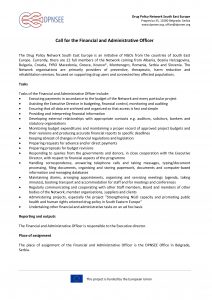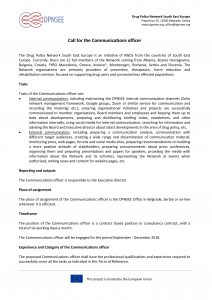At the meeting held on 22 June, the DPNSEE Board decided to restructure the Office. To improve efficiency of its work, besides the Executive Director the Staff will now include:
• Financial and Administrative Officer expected to work 80% of working time
• Communications officer, a contract based position or consultancy contract, with a total of six working days a month
The Staff members will be engaged for the period September – December 2018, with a potential to continue working in the next year(s).
If you are interested to join a small and aupportive team of a growing network working for a cause, have a look at the Calls bellow and send your CV indicating the work experience and qualifications and a description of the motives for applying by 27 August, at 12:00 CET.
DPNSEE encourages people who use drugs and members of other vulnerable populations to apply for jobs.
 Call for the Financial and Administrative Officer
Call for the Financial and Administrative Officer
Call for the Communications Officer



